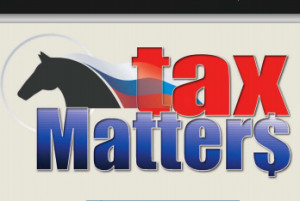Tax Matters – IRS Rules Against Taxpayer
Click here to read the complete article128 – May, 2016
BY JOHN ALAN COHAN, ATTORNEY AT LAW
 A new Tax Court case involving Sally and Michael Judah, residing in Louisville, Kentucky, involved a Saddlebred horse activity and real estate development activities of the taxpayers. [Judah v. Commissioner, T.C. Memo 2015-243.] The taxpayers claimed that the two activities should be considered a single activity for tax purposes, and that the horse activity, in any event, was conducted as a business. The Tax Court ruled against them for reasons discussed below. The taxpayers started the horse activity, organized as an LLC, after their daughter showed talent in exhibiting horses. They maintained a separate checking account.
A new Tax Court case involving Sally and Michael Judah, residing in Louisville, Kentucky, involved a Saddlebred horse activity and real estate development activities of the taxpayers. [Judah v. Commissioner, T.C. Memo 2015-243.] The taxpayers claimed that the two activities should be considered a single activity for tax purposes, and that the horse activity, in any event, was conducted as a business. The Tax Court ruled against them for reasons discussed below. The taxpayers started the horse activity, organized as an LLC, after their daughter showed talent in exhibiting horses. They maintained a separate checking account.
In 1998, they purchased their first horse in consultation with a horse trainer with 20 years’ experience, and claimed deductions for business expenses related to their Saddlebred activity since that time. Their plan was to purchase young horses and increase the horses’ value through training and competing at shows. They hoped to acquire horses at a relatively low cost and later sell them at a much higher value.
One problem was that their primary consideration in purchasing horses was their daughter’s personal preferences. However, they consulted trainers before purchasing or selling horses, and relied on trainers for advice as to what shows to enter and what horse to exhibit at the shows. Their daughter was the rider in most of the horse shows.

The taxpayers prepared a brief “mission statement” a few years after starting the venture, stating they intended to “locate and acquire quality horses, which, through proper training, successful performance, and potential breeding will both enhance the value of the breed and return a substantial profit to the business.” There was no written business plan. The court noted that the taxpayers had no kind of market analysis, budget, or cash flow projections before commencing the activity, and they had nothing more “than a plan to sell horses for more than they paid for them. This is not a business plan and is devoid of any meaningful financial analysis.”
Books and records did not separately account for expenses of each individual horse, and did not track income of each horse individually. The taxpayers advertised through print sources, online publications and horse shows.
The court said that the taxpayers were unable to devote a significant amount of time to the activity because of full-time jobs and other responsibilities outside of the horse activity.
Several horses were sold at a significant profit, and several were sold at a significant loss. The taxpayers never achieved a profit year.
The court noted that the substantial losses were due to high operating expenses, consisting mainly of boarding, training and showing. (Of course, these costs are invariably the largest costs for anyone whether there is a profit or not.)
Click here to read the complete article128 – May, 2016










